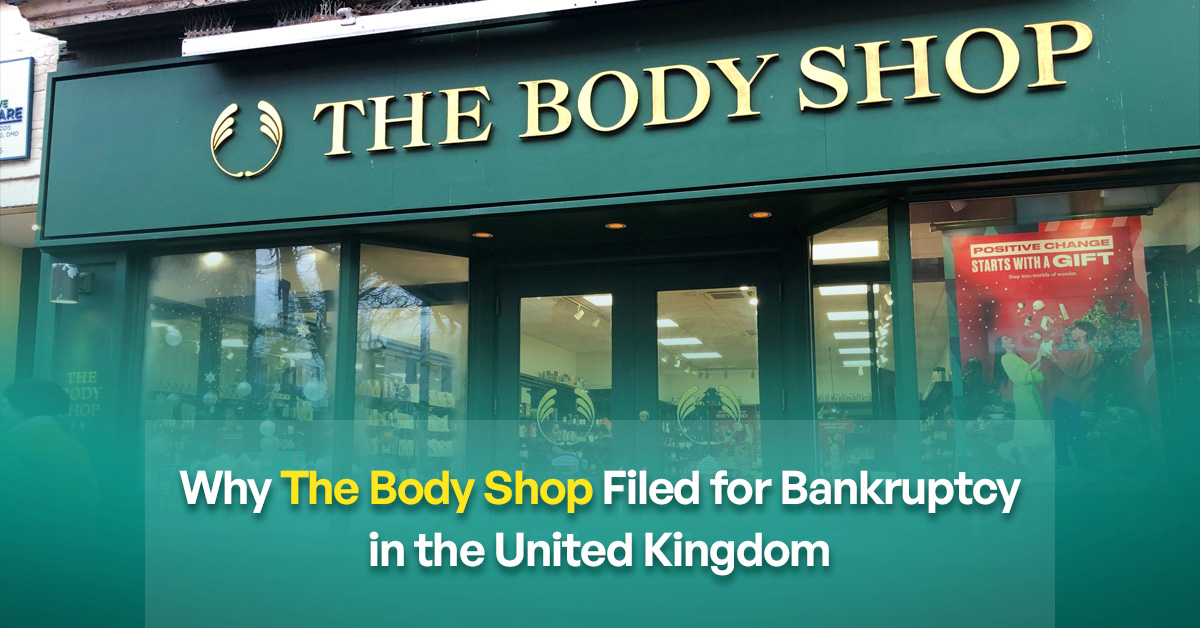In a remarkable twist of fate, The Body Shop, a respected figure in the cosmetics industry celebrated for its ethical ethos and natural product offerings, has encountered a distressing scenario – bankruptcy in the UK. Once a champion of environmental awareness and responsible business, the company’s sudden collapse raises questions about its financial management, global reach, and the evolving beauty industry landscape. In this blog, we’ll delve into what led to The Body Shop’s downfall, examining its financial decisions, global operations, and what this means for the beauty industry at large. Join us as we uncover the story behind The Body Shop’s bankruptcy and its impact on stakeholders worldwide.
Financial Mismanagement and Global Impact
The fall of The Body Shop’s UK arm was caused by a string of financial missteps that had ripple effects globally. Despite being bought by German private equity group Aurelius for over $250 million, hopes for a revamped brand were lost when the company’s financial health declined rapidly under new ownership. Promises of a turnaround under Aurelius’s leadership fell flat, exposing serious issues in how the company managed its finances.
As The Body Shop’s financial troubles worsened, its reputation as a champion of ethical consumerism took a hit. Once loyal customers, drawn to the brand’s commitment to environmental sustainability and social responsibility, started to question its financial management. The gap between The Body Shop’s values and its financial reality became glaringly obvious, making its struggle to stay competitive even harder.
The failure of The Body Shop under Aurelius’s ownership offers valuable lessons for businesses involved in mergers and acquisitions. It highlights the importance of thorough research, careful planning, and smooth integration after the deal is done. Transparency, accountability, and responsible decision-making are essential, especially in industries where consumer trust is key.
Now, stakeholders are left grappling with the fallout and wondering what comes next. Employees face an uncertain future, suppliers are left unpaid, and customers are left scratching their heads. The Body Shop’s collapse serves as a reminder to learn from mistakes and adapt to survive. By taking stock, making changes, and managing finances wisely, businesses can weather storms and come out stronger on the other side.
Impact on Overseas Operations
The impact of The Body Shop’s UK bankruptcy isn’t just felt at home – it’s sending shockwaves across its global subsidiaries in the US, Canada, Australia, and Europe. These branches, once thriving, are now caught in the aftermath of their parent company’s demise.
In the US and Canada, where The Body Shop had flourishing operations, the news hit hard. Despite their past successes, these subsidiaries had no choice but to file for bankruptcy, leaving employees, suppliers, and customers in uncertainty. The sudden unravelling of these once-profitable entities shows how interconnected global businesses can be and how vulnerable subsidiaries are to their parent company’s financial troubles.
In Australia, things are equally tough. While the Australian branch hasn’t gone bankrupt yet, it’s on the edge as it struggles to handle mounting debts amid a cash flow crisis. Without access to funds from its UK parent, the Australian operation is fighting to stay afloat, highlighting the challenges of managing debts on a global scale.
The fall of these overseas businesses shows just how big The Body Shop’s financial problems are and raises questions about its ability to handle global operations. It’s a warning for companies expanding internationally – solid financial management and risk mitigation strategies are crucial for weathering unexpected challenges.
As stakeholders worldwide deal with the fallout, they’re left wondering about their own futures. Employees worry about their jobs, suppliers worry about getting paid, and customers worry about losing access to their favourite products. The downfall of these once-thriving subsidiaries is a reminder of how fragile businesses can be in today’s interconnected world and the need to stay resilient in tough times.
Cash Pooling and Financial Constraints
At the heart of The Body Shop’s financial collapse was its complex financial structure, notably cash pooling. Overseas branches pooled funds into a UK-based account for centralised financial management. However, when the UK parent company went into administration, access to these funds was abruptly cut off. This left overseas branches stranded without resources to cover debts owed to suppliers and creditors, revealing the risks of centralised financial systems during crises.
Mismanagement of Funds and Debt Burden
Poor money management and overwhelming debt have worsened The Body Shop’s financial woes, pushing it into a dangerous cycle of insolvency. Reports reveal the company owes millions to various parties, from landlords to marketing agencies. Failing to pay these debts has caused disruptions, including store closures, layoffs, and the loss of vital services like e-commerce platforms and inventory restocking. These challenges only deepen the company’s financial troubles.
Aurelius’s Role and Future Prospects
As the top creditor of The Body Shop’s UK business, Aurelius holds considerable influence over its future. The private equity group’s control of brand rights puts it in a prime position to reclaim the company from administrators, should it choose to do so. However, the extent of Aurelius’s involvement in The Body Shop’s financial troubles remains unclear, raising questions about its stewardship of the iconic brand and its commitment to its long-term viability.
Navigating Uncertain Waters
In the wake of The Body Shop’s bankruptcy, stakeholders are left dealing with uncertainty and seeking answers to critical questions about the company’s future. Employees, suppliers, and customers face upheaval as the company’s future hangs in the balance. Administrators are tasked with untangling complex financial webs and charting a path forward for the beauty retailer, all while striving to reduce the impact on those affected by the company’s financial collapse.
The Road to Recovery: Can The Body Shop Overcome its Financial Crisis?
The Body Shop going bankrupt in the UK is a wake-up call for businesses dealing with tough competition and unpredictable markets. Despite being known for its ethical values, the company’s money problems show how dangerous it is to mishandle finances, rack up debts, and rely too much on centralised money systems. As everyone waits to see what happens next, The Body Shop’s future is uncertain. People are wondering if this iconic brand can bounce back and be a top player in the cosmetics world once more.
Call us on 0800 246 1845 or email us at mail@leading.uk.com to learn more about navigating financial challenges and making sure your business remains stable.






